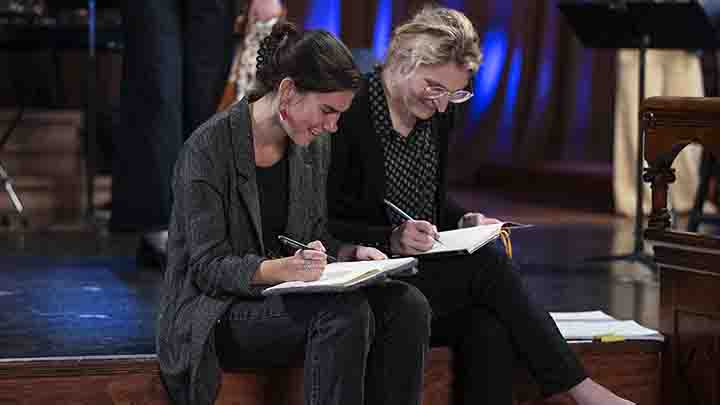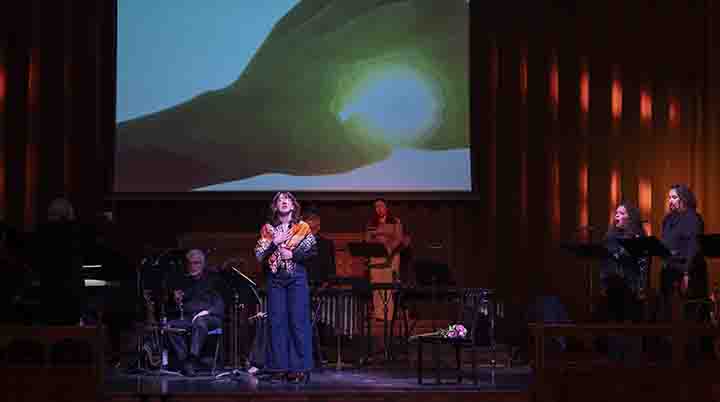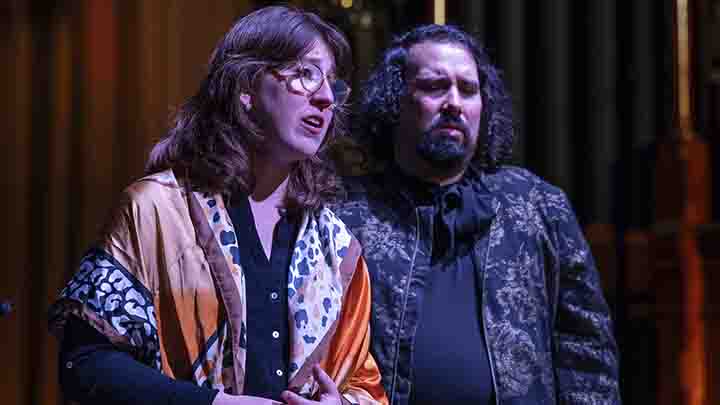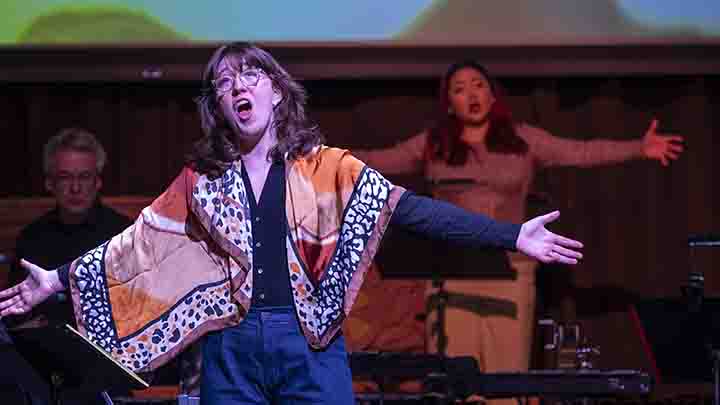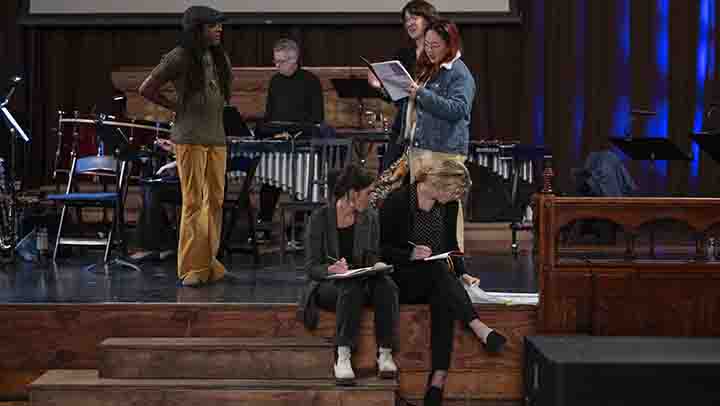Talking chairs, loving ghosts, attentive friends—all central components of The Weight of Light by Gillian Rae Perry, a sweet and sensitive new opera presented in concert form by the Chicago Opera Theater. Although she has worked extensively as a composer and singer-songwriter, The Weight of Light is Gillian Rae Perry’s first opera. These are precisely the artists that the Chicago Opera Theatre’s Vanguard Initiative exists to support: experienced composers looking to apply their skills to a new medium.
Artists spend two years in residence with the Chicago Opera Theater to build the opera composer’s unique skill set: vocal scoring; dramatic pace; instrumentation; working with singers, directors, conductors; the administrative logistics of music publishing and industry networking. By the end of this mentorship process, Vanguard composers have produced a full-length operatic work for the Chicago Opera Theater to present as a concert performance. Complete but minimally staged, the works are then ready to be snapped up and fully staged by any opera company looking to premier new works.
The Weight of Light traces the life of Emily (Hayley Fox), a young girl who discovers that she can do more than just see and interact with objects—she can hear them, too. Emily’s mother, Dawn (Michelle Mariposa), shares her gift. While Emily and Dawn delight in the vitality of things, finding new pleasures in the dishabituated world around them, they also become frustrated by warring sensory inputs; heavy is the head that communes with windows and chairs.
Enter The Weight of Light’s chorus of three (Karlos Pinero-Mercado, Louise Floyd, Leah Dexter) echoing behind Emily and Dawn as the objects themselves. These harmonies—sometimes honeyed, sometimes discordant—interrupt the “main” dialogue with an eager line of questioning: I am the chair. Can you hear me? Seeking respite, Emily tries to tell her friend, Trevor (Karlos Piñero-Mercado); a scared Dawn instructs her to keep their secret no matter what. After Dawn’s death, Emily begins to hear her mother in those same windows and chairs, realizing that her extraordinary connectedness to things can facilitate her ordinary connectedness to people.
Perry has taken up this coming of age story—expressed in a conversational, somewhat unfocused libretto by Marcus Amaker—and set it to music with buoyant sensitivity. Her score, gracefully conducted by Alexandra Enyart, features sinuous lines for the clarinet and warm ripples of harp that brush smoothly against the sung melody. Vocally, Michelle Mariposa stood out as Dawn. Dawn’s aria was some of the opera’s most beautiful music: a meditation on the burden of silence passed from mother to daughter; the plot’s emotional core, particularly as rendered by Mariposa’s rich, powerful mezzo.
Piñero-Mercado, Dexter, and Floyd’s deconstructed chorus of objects was another musical highlight. Imagine: three overlapping vocal lines, consonants separated from vowels, words shared by singers, ideas conveyed only by careful attentiveness to all three voices at once. The diva brashness of all three singers’ stage presences made their demands to be heard as charming as they were surreal; when the chair asked to be heard, Emily—and the audience in turn—had no choice but to hear it.
By contrast, in their other role as Trevor, Piñero-Mercado’s strong, clear tenor was all sensitivity and earnestness. They made an effective foil for Hayley Fox, whose sweet and grounded soprano voice convincingly took Emily from childhood to adulthood.
Talking to some of the key figures involved in bringing The Weight of Light to life, the piece’s interest in community and communication seems like a natural reflection of its own composition process. Rooms where everyone present gets to have their say (despite the challenge of sorting through competing voices) were the sites for not only Light, but also Light’s creative method. In our conversations, composer Gillian Rae Perry, Vanguard Initiative Program Director Lidiya Yankovskaya, and singer Karlos Piñero-Mercado all praised Vanguard as a highly collaborative operation.
Yankovskaya, in particular, stressed Vanguard’s focus on teaching budding opera composers the skill of juggling collaborators—librettists, directors, conductors, singers—and weighing external contributions against their personal point of view. As Yankovskaya told us, “composers have to assert what their vision is,” even as they incorporate generative feedback from a wide range of opinionated artists. Like Emily discovering her gift, Vanguard fellows (ideally) come through a process of intense multivocality with a stronger sense of their own individual voice.
This was a sentiment echoed by Perry, who kept returning to the effects of Yankovskaya’s mentorship on her composition. For her, the art form itself was an inevitability: “As soon as I knew about opera,” she asserted, “I was like, I’ll do that one day!” In a college assignment to make a ten-year year plan, in fact, Perry included: “Write an opera in the next ten years.” She turned in that assignment as a freshman, age seventeen; The Weight of Light premiered two months after her twenty-eighth birthday.
As confident as Perry was at seventeen, making the jump from composing shorter works to full-length dramatic pieces is never easy. It requires the luxury of time and space for experimentation. As Yankovskaya observed, this luxury is becoming rarer and rarer to find. With footage from new operas being disseminated widely and immediately on social media, composers are less able to transform their works in response to feedback. To put it another way: public response “freezes” new works in earlier and earlier phases of their creative processes.
The Vanguard Initiative, then, aims to carve out for its fellows some of the luxuries—time, money, support, feedback—available to an earlier generation of composers, resources that were once the standard rewards of the patronage model. Vanguard, however, offers these opportunities to composers whose backgrounds are more diverse than the opera industry standard—which, where composers are concerned, is still weighted heavily towards the white and male. Perry relayed, for example, that she knew Vanguard was a good fit when her interview for the program was conducted by a room full of women.
Karlos Piñero-Mercado, for their part, described a similar feeling of exceptional support in a rehearsal room full of queer and trans artists. Modeled on Piñero-Mercado, the character of Trevor is also non-binary—or, as a pleased Piñero-Mercado put it: “I played myself!”
If the Vanguard Initiative, as its name implies, exists to develop new frontiers of operatic composition, it is clear that a key part of that development will involve filling production teams and rehearsal rooms with diverse, collaborative artists. Why?Lidiya Yankovskaya sums it up: “If we stagnate, there’s not going to be a future for opera.”
Photos: Michael Brosilow

